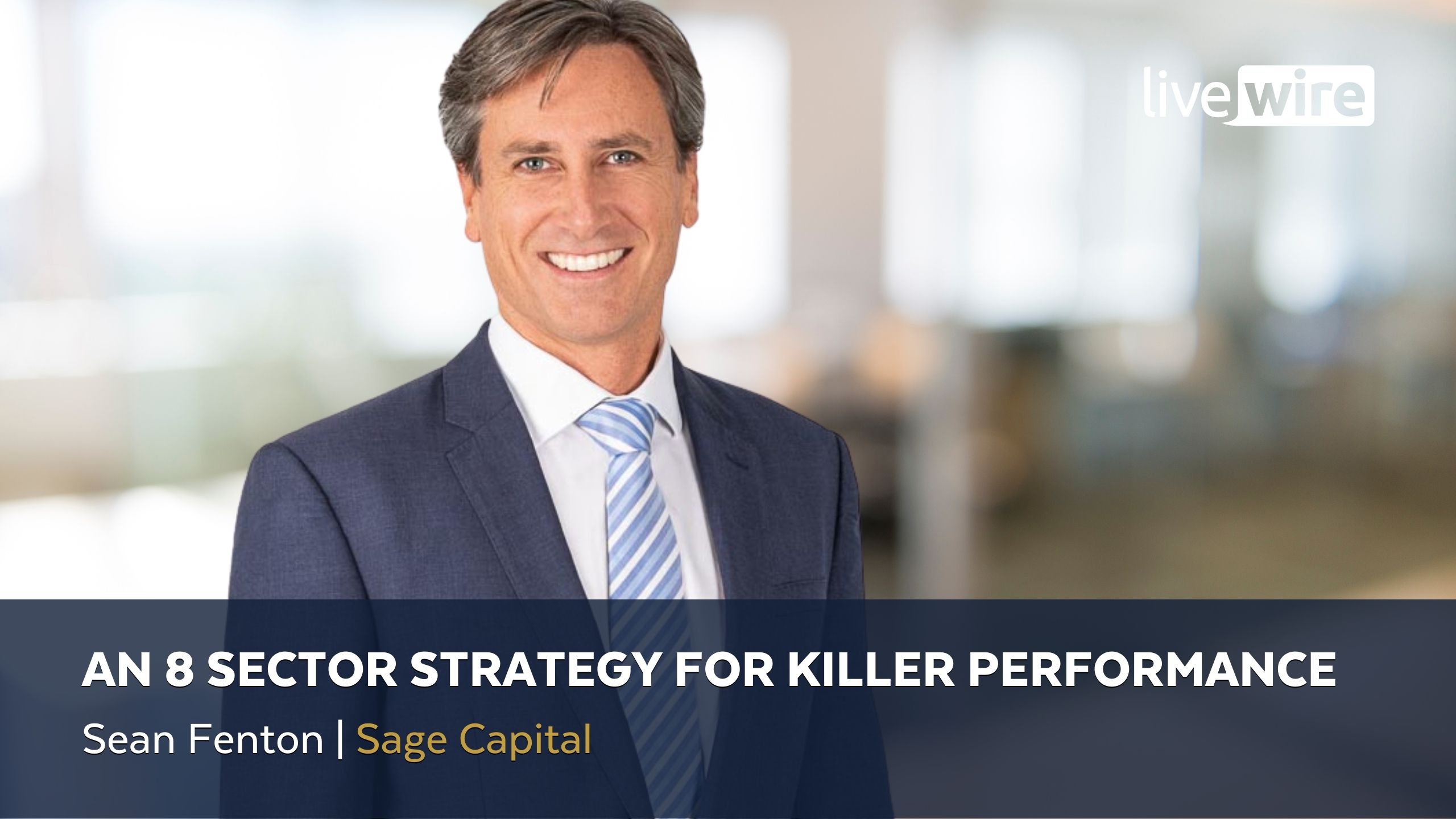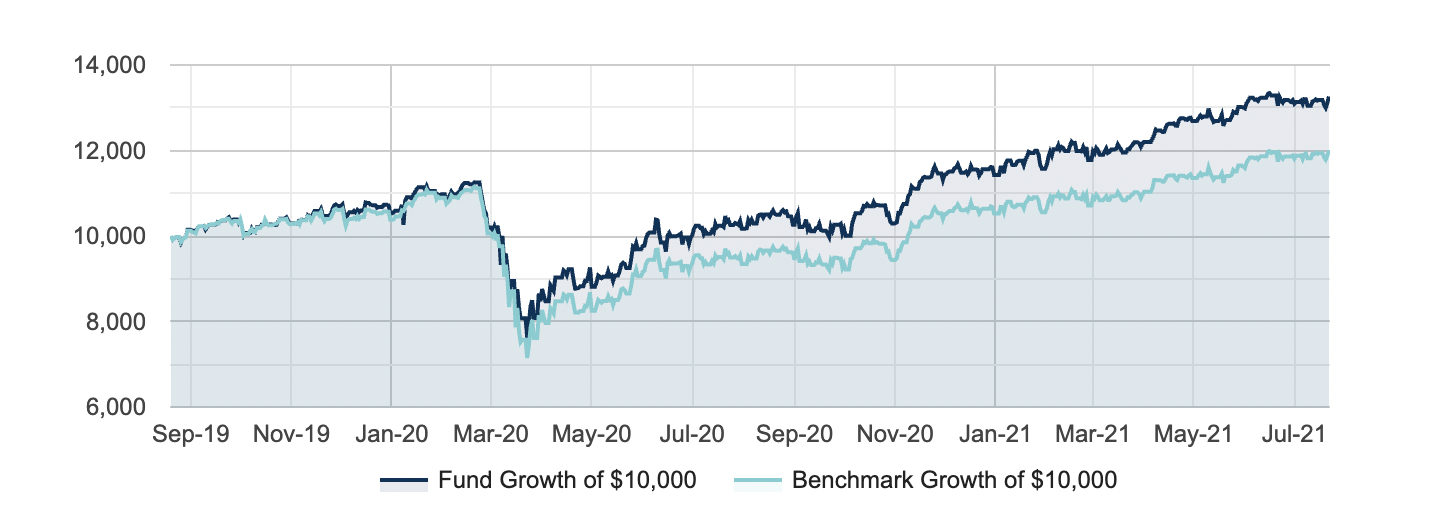An 8 sector strategy for killer performance
Most teenagers spend their waking hours daydreaming about the opposite sex, trying their first alcoholic beverage (in my case, Passion Pop), and engaging in other types of tomfoolery.
At the ripe age of 12, Sage Capital's Sean Fenton was investing, a passion that would bubble away through the mid-eighties and see him land his first role as a portfolio manager in 1997 at just 25 years old.
Fenton is undeniably laid-back, amicable and warm, attributes which have no doubt helped him climb the ranks of Australia's investment arena and become the manager he is today. And yet, it is Fenton the investor - cold, analytical, stripped of emotion - that his investors entrust their life savings with.
As the managing director and portfolio manager of his own investment management firm, Sage Capital, Fenton has two long/short funds under his belt.
The first, the firm's flagship Equity Plus Fund, has delivered investors an outperformance over the S&P/ASX 200 benchmark of 6.25% (after fees) since launching in August 2019. The second, a market neutral, Absolute Return Fund has outperformed its RBA cash benchmark by 9.19% (also after fees since August 2019).
From some of his best bets since the firm's inception to investing as markets "climb the wall of worry", as well as why he believes the Value rotation still has legs. Here, Fenton puts everything on the table to help investors navigate the current market environment.
Note: This interview took place on Thursday 22nd of July 2021.
.jpg)
The making of Sean Fenton
Fenton has been investing since before he could drive, with his father - who ran a TV repair business and managed his own retirement savings - encouraging him to try his hand at the share market.
"He bought me a couple of shares in my name when I was 12 and I would follow them and read through their reports," Fenton recalls.
This was through the mid-eighties, he says, a time of raging bull markets and the now notorious, high-flying tycoons like Alan Bond and Christopher Skase.
He would go on to do his work experience at Rivkin & Co, where he ran contract notes around town in the days before electronic settlement. At university, he studied commerce and law, after which he would nab a graduate role as a research assistant at Credit Suisse.

Before long, Fenton was promoted to an equity strategy role. Here he worked with the firm's economists and strategists to sharpen his focus on top-down analysis - from how broad macro themes can drive markets, to the impact of central bank policy on risk appetite.
In 1997, Fenton moved across to the buy-side in the quantitative team at AMP, where he spent time analysing the factors that drove stock performance and returns.
"That was extremely valuable in helping to generate and actually understand what actually works and what drives returns in the market - and it was a bit more technical in terms of portfolio construction and controlling risk," he said.
Here he met Kelli Meagher, now a portfolio manager at Sage Capital, who worked across a different equity team at AMP Capital. Despite being in different teams, Fenton describes the AMP of this time as being "collegiate", with various teams working together to share ideas and meet company management.
"AMP has since had a very sad fall from grace - I'd like to say since I left - but it probably started before then," Fenton says.

In 2004, Fenton left AMP to work at Tribeca, where he developed the investment process that he still uses today; a broad, quantitative stock selection process as a foundation, layered with in-depth company analysis and a focus on the macro environment, portfolio construction and risk control.
"So I was able to build that process, run some long/short funds and get some good hands-on experience in terms of developing and refining that process over the years at Tribeca," he says.
"I've been lucky in that I have had quite diverse and valuable experiences across the finance sector, and that is probably one of the strengths that we have at Sage - our whole approach is quite broad and comprehensive and we look at many different aspects of investing as opposed to just one dimension."
Taking the leap
Life is full of sliding door moments, Fenton says, and his was a chance meeting with the team at multi-partner asset management business, Channel Capital.
"I had a chat with Glen Holding, who was the CEO of Channel Capital and we got along really well," he says.
"They were keen to grow their business and back something new. And that opportunity was probably the catalyst for me to get things moving."
Despite the push and pull that may influence or restrict one from going out on your own, Fenton says he always felt a deep desire to take control of his own destiny.
"Stepping out from Tribeca was about going from a place that had a range of different funds and people with different focuses to a new firm with the right incentive structures, with all the partners being equity holders in the business, with the team focused on the one investment strategy," he explains.
"It was always going to be a bit scary, but I guess one of the things about being an investor is that you have to be a bit cold and analytical about risk and return and strip the emotion out of things."
Early on, the business's biggest challenge was momentum - Fenton reveals.
"There are always people who go 'Something new? Fantastic, let's invest!' But there are always a lot of people who are risk-averse," he says.
"We were really lucky with the support we got - not just from Channel - but from others in the market too. The investment consultants gave us some good ratings and some early backers helped get the fund up and running."
The business's funds have grown exponentially since launching. Having started with just $2 million in funds under management (FUM), Sage has grown that figure to $120 million in investor savings in just under two years.
The firm's flagship long/short fund has returned 15.96% since its inception in August 2019, and 32.22% over the past year (both after fees). In comparison, the fund's benchmark S&P/ASX200 Accumulation Index has returned 9.71% and 27.8% respectively (an outperformance of 6.25% and 4.42%).

Fenton and the team also run an absolute return fund - which he says balances out these long and short positions to strip out market exposure and deliver returns uncorrelated to other asset classes.
"That's pretty unique these days where everything seems to be correlated - from equities, to bonds, to cryptocurrencies and everything else," he says.
This fund has delivered investors returns of 9.49% since its inception (August 2019) and 7.77% over the past 12 months. In comparison, its benchmark (RBA cash) has returned 0.3% and 0.07%, respectively.
Why now is the time for long/short funds
Fenton believes that long/short funds are able to deliver high returns without concentrating towards a style (i.e. Growth versus Value) and losing the benefits of diversification.
"If you think of a long-only equity fund, if it wants to deliver high returns, it needs to hold fewer positions and the risk-return trade-off tends to deteriorate as you focus that down to move into style areas," he explains.
Every year, roughly half the companies will underperform the index and half will outperform, Fenton says. Employing a long/short model means that Sage only needs to get 55%-60% of these calls right to produce "killer performance".
To do this, Sage groups the stocks within the S&P/ASX 200 into eight sectors:
- Domestic cyclicals (retail and builders)
- Global cyclicals (mining services and agriculture stocks)
- Defensives (supermarkets and telcos)
- Resources
- Gold
- Growth stocks (typical healthcare and tech names, but also retail names like James Hardy and Breville)
- REITs
- Yield (banks and insurance)
"What we're trying to do long/short wise is to pick the best and worst of the companies within those groups and be pretty neutral to them," Fenton says.
"We don't take on a lot of style bias. We don't have a lot of macro risks. We're not going to shoot the lights out or blow up if Jerome Powell comes out and announces he will be tightening rates tomorrow."
For example, currently within the global cyclical group, Sage is long Corporate Travel (ASX:CTD) and short Flight Centre (ASX:FLT).
"We see Corporate Travel, with its greater exposure to the US, making good acquisitions at the bottom of the market with much better growth," Fenton explains.
"Whereas Flight Centre is trying to transition from a retail brick and mortar model, and they're more domestic-focused and also impacted by Australian lockdowns. While the US is opening up and people are travelling again."
Fenton points to other recent long plays like BlueScope Steel (ASX:BSL), which has benefited from inflationary dynamics and a boom in US steel prices, as well as ResMed (ASX:RMD), a beneficiary of COVID-19 that received an added boost after its competitor Philips Respironics had a major recall of its C-PAP machines.
On the short side, Fenton points to AGL Energy (ASX:AGL) and A2 Milk (ASX:A2M) as winning positions, the former which has slid 54% over the past year, and the latter which has suffered a similar fate, falling 68%.
"Coal-fired power isn't exactly the flavour of the month, and AGL has been worn down from pressures of solar swamping the wholesale electricity market and driving prices down there," Fenton says.
"A2 Milk has been a good short as domestic competition in China heats up and it has been impacted by COVID-19 lockdowns and daigou reseller channels."
How to position your portfolio in the current environment
Fenton expects the bond market to find "a level" at some stage in the near future and start drifting higher - resulting in further upside for cyclicals over Growth over the medium term.
"Gun to my head, I'd say inflation's probably going to persist a little bit longer and we will get to the point where central banks start easing back from that policy," he says.
"Bond yields have gone back to lows, but I expect it's got more to do with positioning with everyone expecting inflation to prop up in the cyclical recovery. So we'll see where we go from here, but I suspect economic growth will continue to recover and cyclical earnings do well."
In terms of cyclical companies that Fenton believes have further upside ahead of them, he points to BlueScope Steel, Incitec Pivot (ASX:IPL), CSR Limited (ASX:CSR), Oil Search (ASX:OSH), and Origin Energy (ASX:ORG) as examples.
He's also been buying CSL (ASX:CSL) over the last few weeks, which has been under pressure over concerns surrounding its plasma collection in the US - both from the impact of lockdowns, but also an increase in unemployment benefits.
"Plasma collections have fallen and that feeds through the pipeline so that they have less product to sell in 2022 and going forward. There have been concerns that this would hit revenue, but we believe there are two issues with this argument," Fenton says.
"Firstly, this is something that's reasonably short-term that will resolve itself. CSL is a very strong long-term growth company. But it also negates the fact that it's an industry-wide issue and is likely to probably reflect itself in the pricing of the end products, particularly Immunoglobulin G."
This is a rare opportunity to buy a great long-term growth company, with a high return on capital, Fenton says. It's also well-positioned in the market, it has invested heavily in its collection network, and there is also a degree of consolidation within the sector.
"They've got real pricing power, some unique products, and good underlying growth there. And when we see the market sell it off and focus on a short-term issue that could even turn out to be a positive driver of a stronger pricing cycle, we see a good risk-return opportunity there," he adds.
In terms of current shorting opportunities, Fenton notes that the team is trying to find companies that won't benefit as much as earnings recover across the market.
"Reece (ASX:REH) stands out to me as an opportunity. Just from a valuation standpoint, it's probably one of the most expensive stocks in the market at the moment," he says.
Treasury Wine Estates (ASX:TWE) is also a potential short for the team at Sage, Fenton reveals.
"There is a risk of a potential takeover or a break up of the value of the Penfolds brands. But Michael Clarke has left as CEO, they have some very aggressive margin targets that they have had to back away from and they've had to re-examine their distribution model in the US and wind back growth targets," he explains.
The problem for the winemaking business is that a lot of its growth had been driven by increasing sales to China, which were sold at higher margins thanks to hefty tariffs on Australian wine.
"They might be able to be switched around to Europe or Southeast Asia to recover those volumes, but the impact of losing the highest margin part of the market is going to be difficult to compensate for," Fenton says.
"So, we see some decent earnings risk there. And the price has rebounded a fair way from its lows, so it doesn't necessarily look particularly cheap."
What to expect next for the market
Fenton explains that typically when inflation is bubbling up, investors believe they should be invested in assets and companies that provide inflation protection and hedges, like resources and commodities.
"But what you find happens when the market starts to worry about the Fed tightening its policy or if it's tapering its bond purchases and the yield curve flattens a bit, inflation hedges and cyclicals can actually get hit the hardest in that environment," he says.
If this starts to happen, Fenton recommends that investors position their portfolios in defensives and cash-like investments; companies within the utilities and infrastructure sectors that have stable earnings and good yields, or the cheaper supermarkets like Metcash (ASX:MTS) or Coles (ASX:COL) that may fall a bit but will continue to have earnings support.
"Their valuations aren't extreme and their earnings aren't going to be exposed so much to an economic slowdown," he says.
Currently, the "market is climbing the wall of worry," Fenton says. But inflation is the major concern for investors to be aware of.
"A lot of the world hangs on central bank policy support and the fact that they're happy to run inflation hot for a little while as they see it as transitory rather than persisting. But we see evidence that people's behaviours and expectations are changing around inflation," he says.
The major risk facing markets is that even if inflation is transitory, it becomes embedded in the human psyche, resulting in higher wages growth and companies having the confidence to push that through in higher prices, Fenton explains.
"But what will really drive markets is if central banks change their position on inflation. If that position changes, then the world changes," he says.
"If you do get inflation persisting enough that central banks feel they need to fight it, that's going to change markets. But inflation might be transitory. It might come back down again."
He points to Japan as an example, with its persistently low bond yields and markets grinding higher.
"That's the other scenario. Be aware of it, don't necessarily panic," Fenton says.
"I don't think you can afford to stay out of the market in this environment, when money in the bank is being eroded in a real sense by inflation every day. So it's important to be aware of what's driving inflation and to change your mindset if the world changes."
His only caution in this environment is if you are going to be greedy, be liquid.
"You don't want to be in something leveraged or illiquid when the world changes. That's when people come undone."
Learn more
Sean Fenton and the team believe long term value creation is achieved by going deeper into company analysis, balanced with the rigour of an objective process. To find out more, visit their website, or click contact below.

Never miss an insight
Enjoy this wire? Hit the ‘like’ button to let us know. Stay up to date with my content by hitting the ‘follow’ button below and you’ll be notified every time I post a wire. Not already a Livewire member? Sign up today to get free access to investment ideas and strategies from Australia’s leading investors.
3 topics
15 stocks mentioned
1 contributor mentioned


